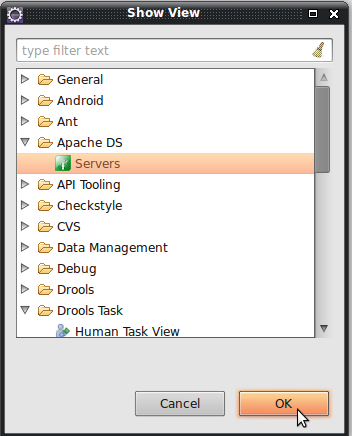

- #Apache directory studio filter editor full
- #Apache directory studio filter editor password
- #Apache directory studio filter editor windows
Objects with givenName "Jim*" and sn "Smith*", or with cn "Jim Smith*"Īll attributes in the Schema container replicated to the GCĪll operational (constructed) attributes in the Schema containerĪll attributes in the Schema container not replicated to other Domain ControllersĪll objects where deletion is not allowed (memberOf:1.2.840.113556.:= cn=Test,ou=East,dc=Domain,dc=com)Īll groups specified user belongs to, including due to group nesting (member=cn=Jim Smith,ou=West, dc=Domain,dc=com)Īll members of specified group, including due to group nesting (!(memberOf=cn=Test,ou=East,dc=Domain,dc=com))) (memberOf=cn=Test,ou=East,dc=Domain,dc=com)Īll users not direct members of a specified group Object beginning with GUID "90395F191AB51B4A"
#Apache directory studio filter editor password
Objects with sAMAccountName that begins with "a" or any number or symbol except "$"Īll users where an administrator has set that they must change their password at next logonĪll users that changed their password since Ap(CST)Īll users with "primary" group other than "Domain Users"Īll computers with "primary" group "Domain Computers" Objects with sAMAccountName that begins with "x", "y", or "z" Groups with cn starting with "Test" or "Admin"Īll users with both a first and last name.Īll users with direct reports but no managerĪll users with specified email users with Logon Script field occupied

Object with description "East\West Sales" The following table shows many example LDAP filters that can be useful when you query Active Directory:
#Apache directory studio filter editor windows
You can take advantage of this if all of your domain controllers are Windows Server 2008, or if you specify a Windows Server 2008 domain controller in your query. Windows Server 2008 domain controllers (and above) have a special behavior A query using a filter with objectCategory will be more efficient than a similar filter with objectClass. Is multi-valued and not indexed (except on Windows Server 2008 and above). That is because objectCategory is both single valued and indexed, while objectClass Also, if you have a choice between using objectCategory and objectClass, it is recommended that you use objectCategory. Use the filter that makes your intent most clear. The following table documents the result of various combinations of clauses specifying values for objectCategory and objectClass: objectCategory However, Active Directory allows you to instead use the following shortcut: (objectCategory=cn=person,cn=Schema,cn=Configuration,dc=MyDomain,dc=com) You can use a filter clause similar to the following: A typical value for an object in Active Directory might be "cn=person,cn=Schema,cn=Configuration,dc=MyDomain,dc=com". The objectCategory attribute is a DN attribute. When your filter clause includes the objectCategory attribute, LDAP does some magic to convert the values for your convenience. Filter clauses can be combined using the following operators: This filters on all objects where the value of the cn attribute (the common name of the object) is equal to the string "Jim Smith" If the attribute is multi-valued, then the condition is met if any of the values in the attribute match the filter. Do not enclose the DN value in parentheses (as is done erroneously in some documentation).
#Apache directory studio filter editor full
If the attribute is DN, then only the equality operator is allowed and you must specify the full distinguished name for the value (or the "*" character for all objects with any value for theĪttribute). Examples of DN attributes areĭistinguishedName, manager, directReports, member, and memberOf. The wildcard character "*" is allowed, except when the is a DN attribute. The value is not case sensitive and should not be quoted.

The in a clause will be the actual value of the Activeĭirectory attribute.

Another operator, ~= (which means approximately equal to) is supported, but no case has been found where this is useful in Active Directory. Step 4: Let us now write the main function for our program and create a SparkSession object as shown below.Note that the operators "" are not supported.


 0 kommentar(er)
0 kommentar(er)
